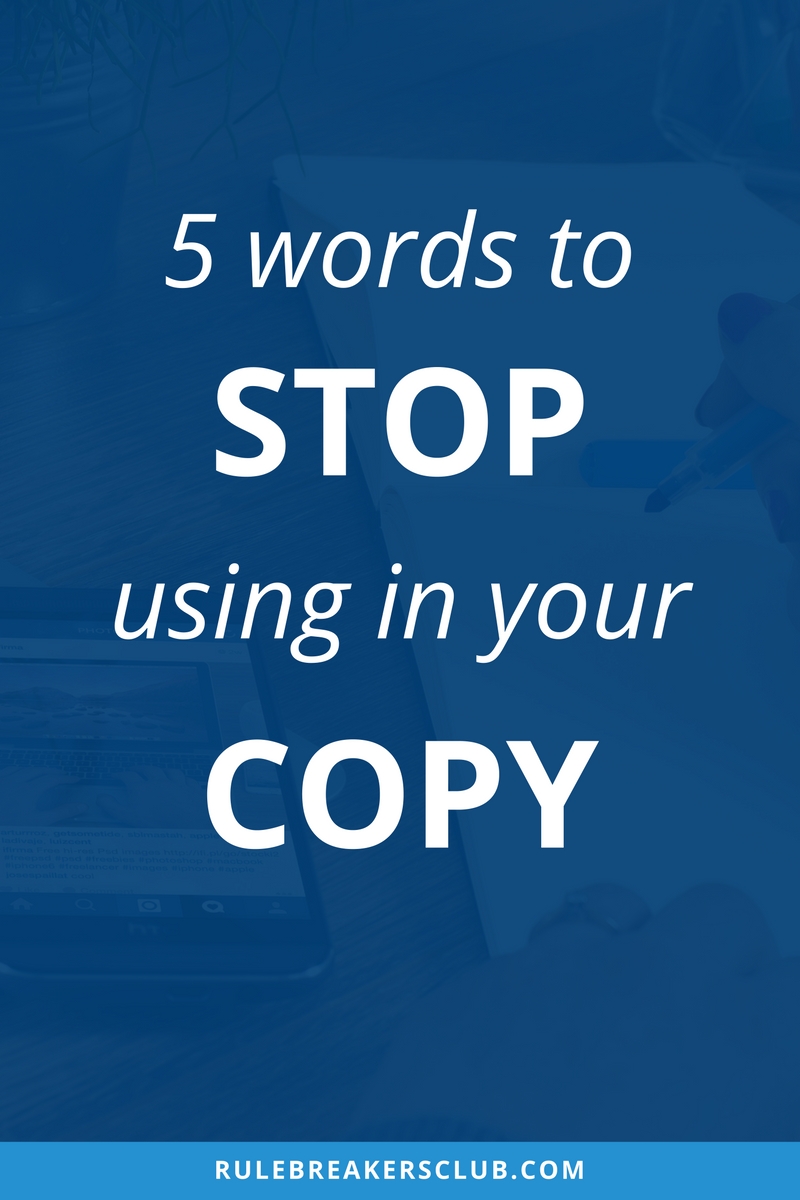Stop! 5 Words to Avoid Using in Your Copy

Because I’ve worked with dozens and dozens of entrepreneurs on their sales page copy through Sales Page CPR, I’ve slowly started playing “favorites” with my language.
In a previous video, I shared with you some “magic words” that you can use in your web copy that work well with almost every audience.
This time, I’m going to step on my soap box again and let you know about 5 words or phrases that I personally try to avoid when working on copy, whether it’s my own or my clients’ copy.
Before I share these words with you, I want you to know that this is my opinion as it stands right now.
The fact that I avoid these words does not mean that I never ever use them, just that they are words that to me seem overused. The problem with using overused words? People’s eyes glaze over when they read them. And that’s not what you want!
Are you ready? Here are the 5 stop words that I avoid using in my web copy:
I’m going to stop using the word {YOUR WORD HERE} in my marketing! http://ow.ly/WHBMJ @CourtRJ ![]()
Grab this list of words to stop using in your marketing ASAP http://ow.ly/WHBMJ via @CourtRJ ![]()
Here are the 5 words + terms I avoid using in my own web copy:
#1 Six Figures –
I imagine this one might be a bit controversial as I know many people who regularly use the term “six figures” in their marketing with no problem.
The reason why I avoid using this term in my marketing is because in the online business world of coaches, consultants, and marketers it’s totally overdone. As I mentioned earlier, when a phrase is used too much, people’s eyes start to glaze over when they see it.
Looking for an alternative to “six figures”? Ask yourself, “What am I really trying to say by this? Am I trying to express the exact amount or am I trying to elevate my brand?” Use your creativity to come up with another way of getting that message through.
#2 Next Level –
Virtually every online program out there has the goal of helping you to get to the “next level”. The reason why I’m avoiding using this term in my web copy is because it’s way too vague. Instead of saying “next level”, show me what the next level is!
When I reach that “next level” what will it look like? What will I be, do, have as a symptom?
#3 Confidence –
This is another term that gets thrown out almost every time I ask someone, “What’s the biggest benefit of your offer?”.
Confidence is not a benefit because it’s way too vague just like “next level”. Confidence at doing what? What does confidence look like? The answers to these questions will give you more specific language to use.
#4 Solopreneur + Freelancer –
These terms are ones that I have a personal conflict with because I believe that if you’re running a business, you are not a “solopreneur” or a “freelancer”. I try to stay away from words that I don’t believe are good to affirm or are a misrepresentation of reality.
It’s totally fair if you want to call me a stickler on this one, but I prefer to refer to business owners as “CEOs”, “Entrepreneurs”, and “Business Owners”. Maybe using one of these words will give you some of that elusive “confidence” we talked about earlier. 😉
#5 Passive Income –
I find the term “passive income” problematic when it’s used to describe launching digital products and programs.
When it comes to things like creating eCourses or online products to stop trading dollars for hours, the term that best represents it is “leveraged” or “scalable” income.
There’s nothing passive about creating an online program. Anyone you see doing this at a high level and creating an amazing amount of revenue has poured a ton of heart, soul, strategy, and hard work into developing, launching, and executing their program.
Leveraged? Scalable? Yes.
Passive? Not at all.
Those are the words that I personally choose to avoid in my copy.
You may not agree with them, and if so, that’s ok. I prefer that you choose language that feels authentic and perfect for your marketing rather than sticking to this list because I said so. This is The Rule Breaker’s Club after all.
Tweet me @CourtRJ and let me know: What’s a word that you try to avoid using in your copy?
Remember, this isn’t about bashing language or calling people out.
The point is to be discerning about the language we use to make sure that it accurately describes what we’re trying to say. The way that your audience reads your language is even more important than the way you intend it to be read.
COURTNEY CHAAL
© Courtney Chaal 2024
Site Credit
Privacy Policy
Terms
Disclaimer